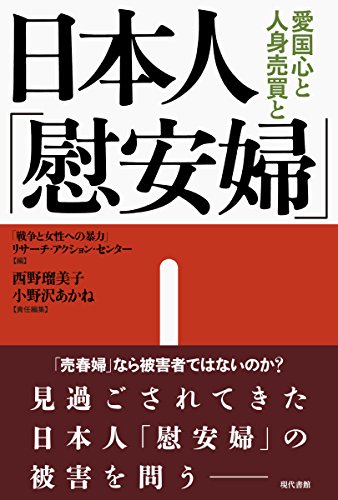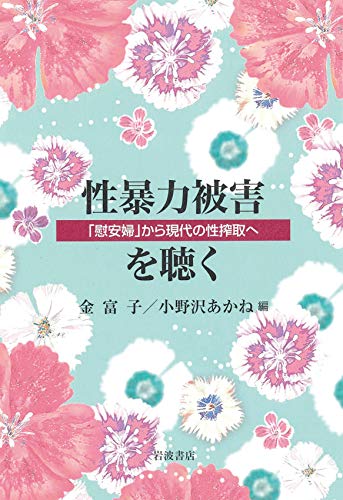534 0 0 0 性販売女性の支援活動に関する日韓比較同時代史研究
韓国では買春処罰を規定した性売買防止法の制定(2004年)をきっかけに、性売買を性搾取ととらえて性販売女性(いわゆる売春に従事する女性やAV出演女性を本研究ではこのように呼ぶ)の非犯罪者化を目指す「性売買問題解決のための全国連帯」が結成され、各地における相談所・シェルター・自立支援センターの設置、政府による生活援助金の支出を実現した。さらに性販売経験当事者女性たち自身による反性売買運動が展開している。本研究は、脱性売買支援運動に関して、日韓で差異が生み出された歴史的背景の分析を行いつつ、世界の脱性売買支援活動にも視野を広げ、当事者視点に立つ脱性売買支援とはどうあるべきかを考察する。
14 0 0 0 OA 近世~近代日本における遊女・娼妓と遊廓社会の総合的研究
- 著者
- 佐賀 朝 松井 洋子 小野沢 あかね 人見 佐知子 横山 百合子 吉田 伸之 金 富子 吉田 ゆり子 塚田 孝 神田 由築 浅野 秀剛 米谷 博 杉森 哲也 初田 香成 松田 法子 本康 宏史 齊藤 俊江 松田 有紀子 屋久 健二 吉元 加奈美 武林 弘恵 ボツマン ダニエル
- 出版者
- 大阪市立大学
- 雑誌
- 基盤研究(B)
- 巻号頁・発行日
- 2015-04-01
本研究では、日本近世~近代における国内各地や植民地の遊廓の調査を進め、遊廓の開発や社会=空間構造を分析するとともに、一次史料を用いて、遊女屋・貸座敷の経営内部における女性たちへの抑圧と搾取の構造の解明も進めた。その結果、近世後期以降の遊廓の大衆化と全国的普及の過程で女性たちに対する搾取が強化される一方、明治維新に伴う公娼制度の改革を経て、女性たちが多様な手段を用いて搾取や暴力に直接・間接に抵抗し、それが遊廓社会の変容を促していくことも明らかになってきた。継続的な現地調査や研究会と研究者のネットワーク化、「遊廓・遊所研究データベース」の充実により、新しい遊廓研究が現れてきた点も重要な成果である。
10 0 0 0 日本人「慰安婦」 : 愛国心と人身売買と
- 著者
- 「戦争と女性への暴力」リサーチ・アクション・センター編 西野瑠美子 小野沢あかね責任編集
- 出版者
- 現代書館
- 巻号頁・発行日
- 2015
- 著者
- 小野沢 あかね
- 出版者
- 独立行政法人 日本貿易振興機構アジア経済研究所
- 雑誌
- アジア経済 (ISSN:00022942)
- 巻号頁・発行日
- vol.61, no.1, pp.72-75, 2020-03-15 (Released:2020-04-01)
- 著者
- 小野沢 あかね
- 出版者
- 大阪歴史科学協議会
- 雑誌
- 歴史科学 (ISSN:09105662)
- 巻号頁・発行日
- no.232, pp.10-20, 2018-04
6 0 0 0 戦時・戦後の日本における売買春問題に関する研究
2005年度には、以下の1,2,3の研究成果をあげることができた。1 戦時における地方純潔運動に関する論文「軍需工場地帯における純潔運動」を『戦時日本の経済再編成』(日本経済評論社、2006年3月31日)に掲載することができた。この論文では、軍需工場地帯となった群馬県において顕著であった青少年工や徴用工の欠勤や不良化、闇取引や軍需工場がらみの経済犯罪に対抗しておこなわれた、同県の社会事業家らによる純潔運動の展開を明らかにした。本稿では、同運動が、国策と実際の戦時社会の荒廃との間の乖離を鋭く批判し、統制経済の指導者批判、人口政策批判を展開したことを明らかにした。本稿をふまえて、来年度にはこれまでの拙稿をまとめた著書を発表する予定である。2 戦後沖縄におけるAサインバー・ホステス経験者に対する聞き取りの成果をもとに論文、「戦後沖縄におけるAサインバー・ホステスのライフ・ヒストリー」を執筆した。この論文では、沖縄本島北部出身のある女性からの聞き取りに基づき、米軍統治時代末期の沖縄における米兵向け水商売で働いていた女性従業員の労働、賃金、労働意識、暮らし、生い立ち、人物像などを明らかにした。1960年代末の米兵向け水商売では、前借金などから相対的に自由なホステスも存在していたこと、借金をしないで労働することのプライドが息づいていたこと、本土での進学・労働経験の持つ意味の重要性などが浮かびあがってきた。
5 0 0 0 OA 1930年代の廃娼運動 : 公娼廃止から性教育へ
- 著者
- 小野沢 あかね
- 出版者
- 公益財団法人 史学会
- 雑誌
- 史学雑誌 (ISSN:00182478)
- 巻号頁・発行日
- vol.106, no.7, pp.1319-1339,1418-, 1997-07-20 (Released:2017-11-30)
The purpose of this paper is to make clear the evolution and logic of the repeal movement against licensed prostitution by the Japan Women's Christian Temperance Union (JWCTU) during the 1930s in Nagano prefecture. At that time licensed prostitution was declining, while, according to the newspapers, "modern" private prostitution solicited by hostesses in cafes was increasing. In Nagano Prefecture, a motion in the prefectural assembly calling for the repeal of licensed prostitution was passed in 1930. At the same time, a motion permitting and regulating private prostitution tacitly was passed. After that, the prefecture and the police required cafe hostesses to pay a tax and be inspected for venereal disease. The JWCTU, which made much of monogamy and child-rearing, insisted that licensed prostitution was sexism and exerted a bad influence on children, because it encouraged human traffic, venereal disease, and demoralization. Therefore, the JWCTU felt that repealing licensed prostitution was the first thing to do to root out all prostitution, and lobbying passage of the motion against licensed prostitution was given the highest priority. In order to get the support of the many members in the prefectural assembly who were not against prostitution, the repealers changed the main point of the motion; but this change was only a strategy, as the goals of the movement themselves did not change. The fact that the JWCTU was against a motion reflecting licensed brothel keepers' interests proves this point. After the passage of the motion, the JWCTU held a lecture on sex education attempting to improve girls' self-confidence about sex and boys' respect for girls. The idea of sex education in the 1930s was almost the same as the logic of the repeal movement during the 1920s. The plan of a "women's home" was also based on this idea of sex education. On the other hand, the idea of sex education encouraged the JWCTU to demand to the regulation of hostesses and cafes, in order to keep them out of their residential areas.
5 0 0 0 大正デモクラシ-期の廃娼運動の論理--長野県を中心として
- 著者
- 小野沢 あかね
- 出版者
- 青木書店
- 雑誌
- 歴史学研究 (ISSN:03869237)
- 巻号頁・発行日
- no.668, pp.p1-15,63, 1995-02
4 0 0 0 OA 近世~近代日本における遊廓社会の比較類型史的研究
- 著者
- 佐賀 朝 塚田 孝 吉田 伸之 人見 佐知子 神田 由築 小野沢 あかね 松井 洋子 吉田 ゆり子 金 富子 浅野 秀剛 伊藤 毅 米谷 博 杉森 哲也 初田 香成 松田 法子 松本 良太 本康 宏史 横山 百合子
- 出版者
- 大阪市立大学
- 雑誌
- 基盤研究(B)
- 巻号頁・発行日
- 2011-04-01
本課題では、日本近世~近代における「遊廓社会」の形成・普及の歴史について、三都と中核とする列島各地や植民地の事例も視野に入れて、比較類型史論・都市社会=空間構造論の方法を用いて共同研究を実施した。その最大の成果は、『シリーズ遊廓社会』全2巻(吉川弘文館)であり、本課題の代表者・分担者・連携者・協力者21名による論稿を掲載することができた。列島各地で個別の現地調査や、調査と一体の研究会を開催し、遊廓研究のネットワーク化を図るとともに、府県別の遊廓・遊所の沿革と史料情報を内容とするデータベースWEBサイトを構築し、今後の遊廓・遊所研究の発展につながる基盤を構築した点も特筆すべき成果である。
4 0 0 0 戦時・戦後の日本における売買春反対運動の研究
1 戦時戦後の廃娼運動・売春反対運動・売買春の実態に関して、以下の史料収集・調査・執筆準備を行なった。(1)戦時売春問題・廃娼運動に関して、昨年に引き続き群馬県立図書館などで史料収集を行なうと同時に、『廓清』『婦人新報』などの戦前雑誌から関係史料を抽出・入力し、論文執筆の準備を行なった。戦時労働力動員を背景とした売買春の実態と戦後への連続性、新体制下の遊興取締の実態、廃娼運動の担い手と方面委員制度・社会福祉・国民精神総動員運動・大政翼賛会・優生学との関係、戦時における廃娼の主張の地域社会への拡大の回路などに関して新たな知見を獲得しつつあり、論文の構想を深めている。(2)戦後の沖縄県における売買春の実態に関して、バーの元経営者、元ホステスなどからの聞き取り調査を行なうと同時に、新聞史料調査を行なった。2 戦間期の廃娼運動・公娼制度政策に関して、以下の論文を執筆、学術雑誌に掲載した。「公娼制度廃止問題の歴史的位置-戦間期日本における勤倹貯蓄と女たち-」『歴史学研究特集 性と権力関係の歴史(I)』764号、2002年7月、2〜12頁。3 「女性史研究の運動と方法-1950〜60年代の可能性(仮)」というタイトルの論文執筆をすすめている。本稿は『展望日本歴史1 歴史学の現在と未来』東京堂出版(近刊予定)に執筆依頼されたものだが、近年の女性学研究が完全に見落としている1950〜60年代における日本の女性史研究の問題意識とその可能性を論じたものである。
3 0 0 0 OA 戦後沖縄の米兵向けバーに関する研究-女性従業員の生活史を中心に-
2 0 0 0 性暴力被害を聴く : 「慰安婦」から現代の性搾取へ
- 著者
- 金富子 小野沢あかね編
- 出版者
- 岩波書店
- 巻号頁・発行日
- 2020
- 著者
- 小野沢 あかね
- 出版者
- 日本貿易振興機構アジア経済研究所
- 雑誌
- アジア経済 (ISSN:00022942)
- 巻号頁・発行日
- vol.61, no.1, pp.72-75, 2020
1 0 0 0 OA 日本軍「慰安婦」制度と米軍の性売買政策・性暴力の比較研究
日本軍「慰安婦」制度と米軍の性売買政策・性暴力の比較研究をおこなうことを目的として本研究をおこなった。米国や英国などの公文書館や図書館などにおいて、関連史料を多数収集することができた。また各国の研究者との研究交流をおこない、研究協力のネットワークも作ることができた。こうした研究活動を通じて、日本軍のケースと米軍のケースについてその相違についてかなり把握できるようになってきた。同時に、日本軍「慰安婦」制度を世界史のなかで位置づけるためには日米比較だけでは不十分であり、欧州や韓国を含めて国際比較が必要であることも強く認識するようになった。


